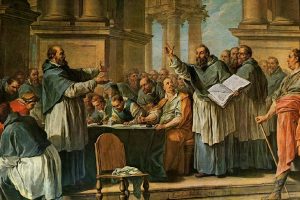"For a child has been born for us, a son given to us… he is named Wonderful Counselor, Mighty God, Everlasting Father, Prince of Peace." These lines from Isaiah 9:6 are some of the most recognizable of the scriptures we hear at Christmastime in the Catholic Church. But was Isaiah really talking about Jesus of Nazareth?
Professor Pauline A. Viviano looks for the answers to these sorts of questions every day in her work as an Old Testament scholar at Loyola University Chicago. Lecturing in the classroom and in parishes, she encourages her audiences to ask themselves: What does this ancient scripture have to say about our lives today? What can the prophets of old tell us about social justice, about who God is?
A frequent contributor to academic and popular journals, she is currently completing new biblical commentaries on Jeremiah and Lamenations.
Why do we hear from the prophets during Advent?
The early Christian community interpreted the Old Testament prophets as foretelling the coming of Christ, and that idea dominated in Christianity for about 1,800 years. It is no longer the dominant interpretation among biblical scholars, who want to determine who prophets were within their own historical context, but it is still relevant in the community at large.
In the Christian Bible prophetic books are rearranged from the Hebrew version so that they are the last part of the Old Testament and lead right into the gospels. The last words of the Christian Old Testament are Malachi saying, "Elijah will come again." And then we move into the New Testament where we have John the Baptist, who is Elijah come again.
Were the prophets foretelling Jesus of Nazareth?
Yes and no. What the church says is that we see in the scriptures the unfolding of revelation, the fullness of which is realized in Christ. As a biblical scholar who also happens to be Catholic, I have no trouble reading the prophets as heralds of Christ. But if you were to ask me: In their own time, what were they talking about? I would say they have no interest whatsoever in proclaiming the coming of Jesus 600 years later.
One of the best examples is the Emmanuel prophecy in Isaiah 7 that we hear every Advent ("The virgin shall conceive and bear a son and they shall name him Emmanuel"). The historical situation is that King Ahaz is being attacked by the king of Israel and the king of Syria. Isaiah gives Ahaz a good news/bad news prophecy: The good news is there is going to be peace in the future; the bad news is it's not going to be during Ahaz's lifetime.
The prophet tells Ahaz to ask for a sign from God that will confirm what he has said. But Ahaz says, "No, I do not want to put God to the test." He's not being pious; he doesn't want a sign because he doesn't want the prophetic message to be confirmed. So Isaiah responds by saying God is going to give him a sign whether he wants one or not, and the sign is: "A young woman is with child, and she shall bear a son, and he shall be called Emmanuel."
The word Emmanuel in Hebrew means "God with us," but it can also be translated "God against us." The sign corresponds to the prophecy that God is against us now but God will be with us in the future. The very next sentence says, "And before this child grows up, the two kings of whom you are in dread, their land will be deserted." Isaiah is very specifically addressing the prophecy to his present situation.
In our lectionary we hear the words "A virgin will give birth," but the Hebrew text doesn't use the word for "virgin." It uses the term ‘almah for "young woman," which applies to any woman right up until she gives birth to her first child.
Also, the tense of the verb in Hebrew is not future; it's not "will conceive." It's best translated to English as "has conceived." She is already pregnant; she has conceived and will give birth. What Matthew quotes is from the Greek Old Testament, which uses the term "virgin" for the Hebrew word and also uses the future tense "will conceive." That fits Matthew's agenda of foretelling Jesus.
As a Christian, I have no problem with what Matthew did. It's very clever, in fact, ingenious. It inspires me. But if you ask me if Isaiah was prophesying Jesus, I would have to say no, he was not.
Who were the prophets?
In the Bible, there are three major prophets: Isaiah, Jeremiah, and Ezekiel. Then there are many minor prophets, such as Hosea, Amos, and Micah.
Over the past 200 years, there have been some changes in how we understand prophets. The consensus today is that prophets are people who speak on behalf of the deity. The predictive aspect of prophecy has been overplayed. Prophets are concerned about the future, but only insofar as the future is a consequence of what's going on in the present.
The root meaning of the Hebrew word for prophet is "to call." But the word could be understood in the passive sense "to be called." All of the writing prophets do have a narrative in which they are called by God. They usually resist the call, but God overrides all objections.
What prophets do is call out, they proclaim, so some suggest that prophet is to be understood in the active sense: "to call out." It's almost as if prophets see to the core, and they're trying to awaken the people to see the consequences of their behavior and why it is not in accordance with God.
Prophets do basically two things: They criticize and energize. They announce judgment, and then they announce hope for the future. Prophets tend to be really contrary people. When everything is going fine, they're announcing doom on the horizon.
How do you know who speaks on behalf of the deity?
That's always a dangerous question. Anybody can claim to speak on behalf of God, but how does the audience discern?
For example, when Amos announces the end of the kingdom, that was a time of great prosperity for the wealthy. But in less than 30 years, the country was destroyed, so people said, "Remember that Amos character? He was right." The problem with that, of course, is you only know who is a prophet after the fact.
Did the prophets have visions or direct contact with God?
Visionary experience did play a role, but it doesn't seem to be a dominant one for the writing prophets, with the exception of Ezekiel. There was also a group of prophets that were called ecstatics. People in the ancient world believed that when the divine touched a human, the human could not contain it; it's a shattering experience. So they did strange things, like Ezekiel lies on his side for a year and a half and never moves.
How did prophetic texts come to be seen as foreshadowing Christ?
It's a process that takes place over centuries. If you identify a person as someone who speaks for God, but only some of their words have come true, then you're going to say, "Well, if this guy is indeed a prophet, then all of the rest of his words must be going to come true in the future."
The situation in Israel was that the dynasty of King David was destroyed in 587 B.C., and it was clear to the community that the dynasty would not be reinstated. But you have prophets who spoke about a future Davidic king. So they begin to reinterpret these prophecies to refer to a future anointed one. (In the ancient world kings were the anointed ones. "Anointed one" in Hebrew is mashiach, the root of messiah.)
Since there was no possibility of a Davidic monarch on Earth, they thought he would come from the heavenly realm and be the embodiment of everything that David was intended to be: a just and righteous king.
By the time you get to the first-century Christians, they are linking the prophets to their contemporary experience. They treat the sacred text as a blueprint for what's happening now. They're not concerned with what it meant in its historical context.
I think many people have a misconception that Jesus was lying in his bassinet as a baby thinking, "OK, when I'm 30, I'm going to have to fulfill this prophecy." That's not the way it happens at all. What happens is Jesus of Nazareth walks around preaching the coming of the kingdom of God, and that gets him in big trouble with the Roman Empire. They execute him, but then God raises him from the dead. And it's only after the Resurrection that the disciples begin to "get it."
They affirm that Jesus is the Messiah, but he didn't come the way Messiahs were supposed to come. He did not establish a kingdom on earth, he did not lead them in victory over Rome. Indeed, he ended up getting crucified. So how can we proclaim that this person is the Messiah when he did not fulfill the expectations? And how do we explain it to the people? Well, you draw upon scripture. You appropriate a prophetic text and apply it to Jesus.
Do Christians who only hear the prophets interpreted through the lens of Christ miss out on learning the historical context?
If you confine your understanding of scripture to what you hear at church on Sunday, then yes, because the way the church has set up the lectionary, the Old Testament reading is usually related to the New Testament reading, and so its relationship to Jesus gets reinforced.
But any Christian who has been educated in historical-critical scripture would understand that there is a distinction between reading a text in its historical context and the later appropriation of the text in the community.
People in the pew are generally concerned with what scripture means to them now. But you can't say what it means now without knowing what it meant then. On the other hand, I know many academics who are not concerned at all about what the text means today. You need the balance.
How do people react when scholars raise questions about the historical accuracy of biblical events, such as the virgin birth?
When I lecture at a parish, I can say almost anything about Resurrection and they don't bat an eyelash. When I touch Christmas, they go into cardiac arrest. People have an emotional attachment to Christmas that they don't have to Resurrection, which is terrible because Resurrection is far more important in Christian theology.
But whether or not something happened is not as important as the meaning of what is really being predicated. We may never be able to say with absolute certainty whether much of what is in the Bible is historically accurate. But when Luke tells you the story of Mary's Annunciation, is he just concerned with saying, "This is what happened"? Or is he trying to say, "This child is of great significance"? And how do we know he's of great significance? Because God intervened in a special way to get this child born. He is to be the Savior and he exists in unique relationship to God. Even if Joseph were the biological father of Jesus, that would not negate Jesus as the Son of God.
If I were preaching in a parish about Christmas, I wouldn't get into whether this or that really happened or not. I would talk about what it means to say that God became human. What difference does that make? It reveals to us the depth of God's love for humanity.
How do non-Christians look at the prophets, specifically prophecies that we consider to be foretelling Jesus?
Part of it depends on whether non-Christian readers of the Old Testament, who would mainly be Jews, are historical-critical scholars or not. Today a Jewish historical-critical scholar is going to approach the prophets the same way a Catholic or a Protestant historical-critical scholar would.
I should mention that there is a 2001 Vatican document about the Jewish scriptures and their use by Christians. Nobody but about five biblical scholars have read it, but it says that as Christians we have adopted the sacred text of another people and thus we have to be very sensitive to how we use those scriptures.
Which prophets influenced Jesus the most?
It's very difficult to say whom Jesus was influenced by. All we know is what Matthew, Mark, Luke, and John thought Jesus said and did. They present Jesus as having a messianic consciousness in fairly developed terms.
But I would suspect that Jesus was influenced by the prophet Hosea, for whom God's mercy supersedes his justice. In Hosea 11, the text jumps back and forth between God's anger-I'm going to wipe them out-and God's mercy-I lifted you up, I held you. That's what Jesus accentuates in the New Testament, that God's love and mercy far outweigh his wrath.
A lot of the prophets emphasize that judgmental, vindictive God.
Yes, and many people don't like the Old Testament because it always sounds like God is having a bad day. But the two ways accentuated in the prophetic material are judgment and salvation, condemnation and hope for the future.
In defense of the Old Testament, the prophets are trying to make sense out of a situation in which their country is being conquered time and time again. They wonder: Does this mean that God is powerless? Has God abandoned us? Or is God trying to wake us up and get us back on track? Their words are meant to say God is trying to wake you up and get you back on track. All of these tragedies in life become disciplinary actions to get Israel to return in obedience to God.
Was Jesus considered a prophet in his own time?
Yes, Jesus is presented in the New Testament in a prophetic role. People believed that when the Kingdom of God came, a prophet would be sent to prepare the way. In Matthew, Mark, and Luke that prophet is John the Baptist. But in John's gospel, it's Jesus.
When Jesus asks the disciples, "Who do people say that I am?" they answer, "One of the prophets." And the cleansing of the temple by Jesus is a classic prophetic act.
Do you see any people since Jesus who you would say are in that prophetic role?
Identifying prophets is always an iffy sort of thing. I think there are prophetic characters, like St. Francis of Assisi. He took a stance that was a direct challenge to the way the hierarchy was living. Any number of saints along the way have taken prophetic stances.
And I think most people would agree that Martin Luther King Jr. functioned as a prophet, challenging the social structures of the day that kept blacks segregated. Today we recognize that he was right. But if you go back to the newspapers in the early '60s, you're not going to find many people announcing how prophetic and wonderful he is. As a matter of fact, they repeatedly condemned him.
We tend to identify a person we agree with as a prophet, when we should really identify someone with whom we disagree. They are the ones that are challenging us to wake up, to see a dimension of reality that we don't see. And then we can ask ourselves: Why is it that we disagree? Why is it that they set our teeth on edge? Is there a part of reality we are ignoring that they are calling us to see?













Add comment